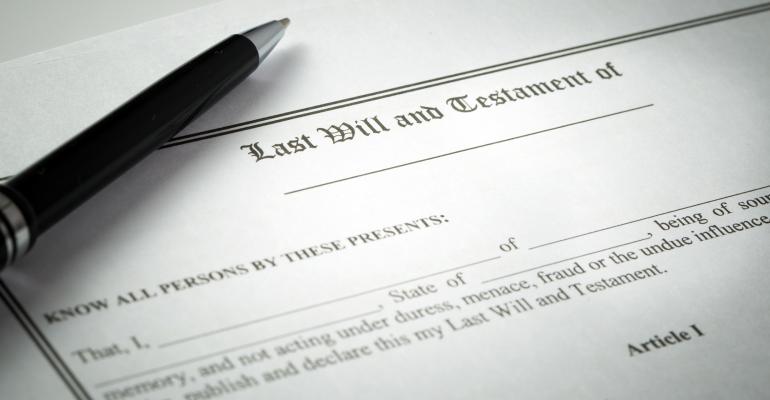At his recent presentation at the National Association of Estate Planners & Councils Advanced Estate Planning Strategies Conference in Las Vegas, “Financial Issues for the Recent Widow or Widower,” Jeremiah W. Doyle IV, estate planning strategist at BNY Mellon's Private Wealth Management group and a Senior Vice President of Bank of New York Mellon, raised an important point—laypeople don’t understand estate-planning documents.
But, you might ask, why is this a concern for estate planners?
Even the most well-prepared clients, who have their estate plans in order, often fail to consider the inevitable burden on surviving spouses of handling their financial obligations post-death. The task is even more difficult for those who don’t have their financial affairs well-organized. For this reason, Doyle recommends taking the time to offer clients a summary of what each estate-planning document (for example, the will, trust, beneficiary designation forms) is. Even a basic understanding of what each document is and does will help the surviving spouse begin the often-daunting task of settling the estate.
Post-Death Planning
In addition to the estate settlement process, Doyle also highlighted some other important financial issues that should be addressed immediately post-death. It may be beneficial to provide clients with a similar checklist, which can help better prepare a future widow or widower. Some of the important considerations that Doyle discussed in his presentation include:
401(k) plans and Individual Retirement Accounts
A surviving spouse needs to determine if minimum required distributions (RMDs) must be taken and, if so, when. Keep in mind that any rollover to an IRA must occur within 60 days of the distribution. Doyle suggests that trustee-to-trustee transfer is the best bet. Furthermore, he adds that if the decedent was 70 1⁄2 or older, make sure the decedent’s RMD was taken before doing the rollover. For surviving spouses under the age of 59 1⁄2, it may be best to wait before doing a rollover or trustee-to-trustee transfer, as distributions may be taken from the decedent’s account without a 10% early withdrawal penalty.
Health Insurance
A surviving spouse who was covered by the deceased spouse’s employer’s health insurance plan needs to determine if continuing coverage is available and the associated cost. For example, a surviving spouse should be entitled to continue on a group plan for 36 months under COBRA. If unavailable, the surviving spouse should consider obtaining new coverage.
Preparing the Final Income Tax Return
A surviving spouse can file a joint return for year of death if the surviving spouse hasn’t remarried and the executor approves the filing of a joint return. For two years after, the surviving spouse can file as a qualifying widow or widower, which provides a higher standard deduction and lower tax rate than filing as single. To qualify, the surviving spouse: (1) must not have remarried, (2) must have a dependent child who lived with the surviving spouse all year, (3) must have paid over half the maintenance costs of the home, and (4) must have been able to file jointly in the year of death, even if she didn’t.
A surviving spouse may also need to be wary of a deceased spouse’s financial liability that she wasn’t aware of. As each spouse is jointly and severally liable for any unpaid taxes, certain situations may require filing as married filing separate so that the surviving spouse doesn’t end up on the hook for the deceased spouse’s past liability.
Tax Issues
A surviving spouse needs to determine if state or federal estate tax returns are necessary. If real estate or personal property is held in another state, determine if a nonresident state estate tax return is due. A state estate or inheritance tax return may be necessary to obtain a release of a state estate/inheritance tax lien on any real estate. Furthermore, Doyle advises planners to remember to discuss portability. A federal estate tax return must be filed to elect portability. Even if a state or federal estate tax return won’t be filed, appraisals for real estate and valuable personal property should be obtained to be able to prove the step-up basis for income tax purposes. Also review post-mortem tax and estate planning elections.
Other Considerations
In addition to the more obvious considerations, such as settling the estate and tax issues, Doyle touched on a few other critical tasks, including:
- Arranging for organ donation (in accordance with decedent’s wishes);
- Funeral arrangements and determining costs involved;
- Acquiring at least 10 to 12 copies of the death certificate, which can be required for transactions such as closing accounts, changing ownership of investment accounts, transferring title to real estate and claiming life insurance and veterans’ benefits;
- Gathering important documents, such as records of digital assets and passwords;
- Search of life insurance policies and initiating the claims process;
- Contacting decedent’s employer regarding unpaid salary, benefits, 401(k) plan, etc.; and
- If death was caused by an accident, bringing potential wrongful death action.
Elder Abuse
Lastly, Doyle also cautioned to remind clients to be wary of potential elder abuse situations. He gave one example of local bankers who offer to put their name on a joint account for “convenience”—what many may not realize is that when the individual who opened the account dies, by operation of law the account goes to the surviving joint tenant (the banker).





